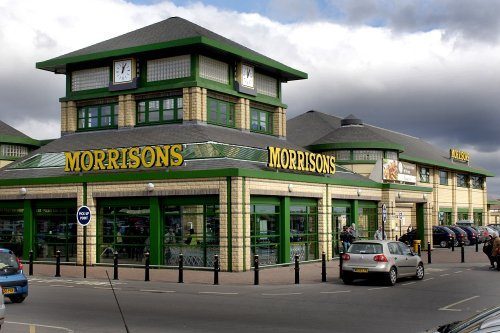‘Volatile trading’ proving costly for Morrisons

Bradford-headquartered Morrisons Supermarket has been coping with “extreme pressures” and “unprecedented volatility of demand.”
The listed retailer has today published a report on its response to the COVID-19 emergency, and a quarter one sales update.
For the 14-week period from 3 February to 10 May 2020, Group like for like (LFL) sales excluding fuel were up 5.7%, comprising contributions from retail of 5.1% and wholesale of 0.6%.
Group LFL including fuel was down 3.9%, with fuel LFL down 39.3%, and down about 70% since lockdown, as customers began taking significantly fewer car journeys.
Total sales were up 5.7% excluding fuel, and down 4% including fuel.
The update adds: “In the most recent weeks, we have gradually returned to normal trading hours, introduced more protective screens to enable all checkouts to open safely at the same time, and availability has continued to improve.
“Customers have become more accustomed to the social distancing protocol in stores, and are spreading their shopping trips throughout the week rather than focusing on the traditional weekend peak.
“Retail contribution to LFL for weeks 12–14 was 9.6%.
“Our online offer is expanding significantly and at pace, providing different home delivery options especially for those customers most vulnerable and in need.
“Throughout the period our manufacturing businesses and supply chain coped well, often under extreme pressure, with the unprecedented volatility of demand, colleague absences, and the challenges of so many new initiatives.”
David Potts, chief executive, said: “We are facing into the unprecedented current challenges and are playing our full part to help feed the nation: working with determination, creativity and pace to serve customers as well as we possibly can.
“The professionalism, enthusiasm and resourcefulness of our frontline key worker colleagues is extraordinary and is showing Morrisons at its very best.”
Morrisons says despite massive upheaval, it continues to operate from a very robust financial position, with a strong balance sheet, low debt and strong debt maturity profile.
During quarter one the business says it further improved its liquidity by extending one £100m revolving credit facility (RCF) from July, and put in place another three new £100m RCFs, taking its total RCF facilities from £1.45bn to £1.75bn.
Of the £1.75bn, £1.35bn runs until 2024 with an option to extend by a year, and the four £100m facilities run for a year with two having options to extend by six months.
The update states: “Day-to-day operations and challenges are currently very different from normal, and we are operating in a more volatile trading environment, which is costly.
“In addition, many of the payroll, bonus, seasonal waste and markdown, distribution, community, and colleague and customer protection initiatives described above come at considerable cost.
“For example, at times we have been experiencing temporary absence rates running at up to 20,000 colleagues.
“We continue to monitor various 2020/21 sales, profit and cash flow scenarios, but have minimal certainty or visibility around a precise outcome.
“At this stage, our best estimate is the 2020/21 costs relating directly to COVID-19 are likely to be broadly offset by the in-year business rates cost saving, but actual net effect is highly dependent on the length of the crisis and how customers respond as lockdown eases.
“In addition, there are other current impacts on profit such as temporary closure of our significant café business, and the considerably lower fuel sales.”







